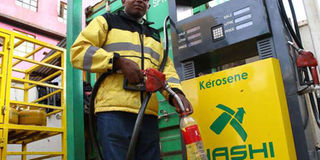The death of kerosene: ERC wants price hike

An attendant at a Nyeri petrol station sells kerosene to a customer. The energy regulator has asked the Treasury and Energy ministries to hike kerosene prices to match that of diesel as it seeks to phase out the product from the local market in favour of clean fuels. PHOTO | FILE | NATION MEDIA GROUP
What you need to know:
ERC says the consumption of kerosene in the country is ever increasing and needs to be drastically cut in favour of clean energy.
Mr Oimeke said the reason for huge kerosene consumption was due to the price incentive.
ERC boss says kerosene price increase would add up to Sh34 billion to the government coffers annually.
Millions of Kenyans who rely on kerosene for lighting and cooking are headed for tough times following a decision by the Energy Regulatory Commission (ERC) to phase out the product from the local market.
ERC said the consumption of kerosene in the country is ever increasing and needs to be drastically cut in favour of clean fuels, solar for lighting and liquefied petroleum gas (LPG) for cooking.
The commission on Friday urged Treasury and Energy ministries to hike kerosene prices to match that of diesel as a way of deterring consumers from buying the product, and in the end phase it out of the market.
“The commission has been engaging the two ministries with the aim of overcoming the problem of fuel adulteration. Currently, the country consumes about 33 million litres of kerosene monthly when ideally it should be less than five million litres,” said ERC Director General Pavel Oimeke.
SUBSIDY
Mr Oimeke said the reason for huge kerosene consumption was due to the price incentive, a factor he said had caused unscrupulous traders to adulterate the product by mixing it with diesel.
“As a result we have about 27 million litres of kerosene that goes into vehicles which are damaging our vehicles and affecting the export markets. We are losing outside markets such as in Uganda, Rwanda, Burundi and parts of Tanzania who have not been buying from us due to the alteration of quality of the product,” Mr Oimeke said.
REVENUE
He said kerosene price increase would add up to Sh34 billion to the government coffers annually.
“Instead of adding VAT [value added tax] on petroleum products, it may be prudent to increase taxes on kerosene to enable the government collect the equivalent Sh34 billion and in essence save our export market and protect our vehicles by consuming the best fuel,” Mr Oimeke said.
He said the commission arrived at the decision after conducting a study on Tanzania which employed the strategy in 2011 and reduced the product’s consumption from 30 million litres per month to five million litres currently.
“There are other alternatives that are being launched like the 1.2million LPG cylinders at a subsidised price and the solar lanterns which will also benefit the country. We are licensing companies to offer those services at a subsidized rate,” he said.
Consumers’ federation of Kenya secretary general Stephen Mutoro said the decision will save the country from health hazards associated with usage of kerosene, but urged for a smooth to shield consumers.
“While we agree with the regulator, we are of the view that the transition should be managed properly. The transition should be made proportionally. Much as it is important, the phase out should not have many adverse effects on consumers,” Mr Mutoro said.




